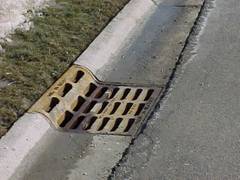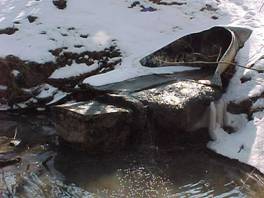
With the beginning of spring comes the rain we need to start our gardens, plant flowers, and achieve that lush lawn that makes our neighbors envious. While the old saying “April showers bring May flowers” is true, rain can also bring potential hazards that we often take for granted — storm water pollution.
Report illegal dumping to storm drains by calling Code Enforcement (847) 746-4019 or Public Works (847) 746-4050.
What Is Storm Water?

Storm water is water from precipitation that flows across the ground and pavement when it rains or when snow and ice melt. The water seeps into the ground or drains into storm sewers — the drains you see at street corners or at low points along streets. This runoff can carry pollutants from driveways, parking lots, and yards into our waterways.
Where Does The Storm Water Go?
Storm water that does not seep into the ground drains into underground pipes, ditches, or creeks and may travel for miles before being released into Lake Michigan.
Did You Know?

Not all substances that enter storm drains can be removed before reaching Lake Michigan — in fact, most are not treated at all! Anything poured into a gutter or storm drain, such as used motor oil or antifreeze, flows directly to Lake Michigan.
Common Contributors To Storm Water Pollution
When it rains, oil, antifreeze, detergents, pesticides, and other pollutants are washed from driveways, yards, parking lots, and streets directly into Lake Michigan — untreated.
Residential
- Pet waste left on the ground is carried by storm water, adding harmful bacteria and parasites to our lake. Always clean up after your pet.
- Vehicle fluids such as oil, gas, and antifreeze are top pollutants. Recycle used oil in sealed containers. Contact SWALCO at (847) 366-9340 or visit swalco.org for disposal sites.
- Instead of hosing off driveways, sweep debris to avoid washing pollutants into storm drains.
- Dispose of paint, pesticides, solvents, and batteries at SWALCO events.
- Prevent street litter (Styrofoam, plastic, paper) by keeping bins covered and secured — Zion’s wind can scatter trash easily!
- Compost grass clippings and leaves, or place them in biodegradable bags for pickup on garbage day.
Industrial
- Chemical spills and uncovered storage areas contribute to runoff — use wash bays connected to sanitary sewers.
- Cover fueling stations and contain spills to prevent entry into storm drains.
- Never hose off spills or debris — sweep instead. All waste and process water must go to the sanitary system.
- Keep cleanup kits accessible and ensure staff are trained in spill response procedures.

Construction
- Materials and chemicals from construction sites can wash into the lake, and soil erosion adds to pollution.
- Contain concrete washouts and prevent runoff into streets and gutters.
- Cover hazardous waste containers and provide secondary containment.
- Use silt fences and BMPs to control dirt and sediment.
- Perform equipment maintenance only in designated areas and manage fluid spills promptly.
Report illegal dumping to storm drains by calling Code Enforcement (847) 746-4019 or Public Works (847) 746-4050.
With everyone’s help, we can all do our part to reduce pollutants in our creeks, streams, and Lake Michigan — our vital source of drinking water.
City of Zion
Department of Public Works and Engineering
Community Awareness Videos
- Illicit Discharge Education and Elimination Video (English)
- Video de Eliminación y Educación de Descargas Ilícitas (Spanish)
Helpful Resources
City of Zion
2828 Sheridan Road
Zion, IL 60099
Phone: (847) 746-4000
Monday – Friday, 8:00 am – 5:00 pm
Closed Daily 12:00pm – 1:15pm
